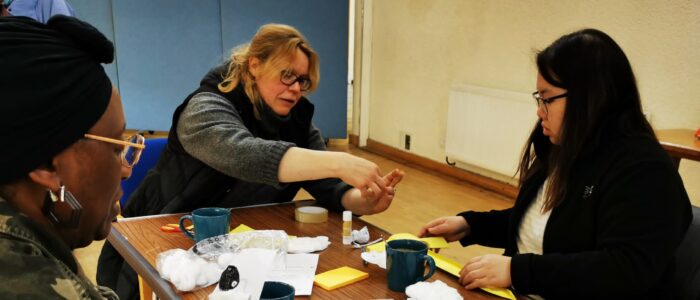Tell me anything and I’ll show you how it’s health!

Much of the activity of faith-based organisations contributes to health and wellbeing. However, commissioners and health and social care professionals don’t always understand this, and faith-based practitioners often don’t recognise it themselves.
I have to admit I do like to watch the odd romantic comedy, and like any firm funny film there is often a punchline or funny phrase which then gets stuck in my head. My Big Fat Greek Wedding has a great scene where the father is explaining how wonderful the Greeks are and how much of modern language is influenced by Greek – “Tell me anything and I will show you it is Greek!” Sometimes the links were somewhat tenuous.
When FaithAction became part of the Department of Health Voluntary Sector Strategic Partnership (DHSP) in 2009, this was a phrase I found myself saying again and again. Many faith groups and faith-based organisations would say, and still do, that they do not have anything to do with health. I would then say, “Tell me what you are doing and I will show you how it’s health or wellbeing”. Unlike the claim in the film, the genuine overlap of health and wellbeing with the activities of faith organisations are real and play a great part in health improvement.
One of the problems we face in the UK is that when we think of health, we picture hospitals, doctors and nurses. This ‘medical’ bias in thinking goes some way to explaining our devotion to accident and emergency departments when a trip to the pharmacy would do. The cost in time and taxpayers’ money is huge.
Faith communities underestimate the contribution they make to health and wellbeing and the potential they have to positively affect this area. FaithAction has published a paper on faith and public health, and on 24 February we will be hosting an event on Faith and Health with Department of Health Minister Alistair Burt MP, to explore and highlight the impact of faith organisations in this area.
There are many issues that require medical help, but there are also many issues presented at doctors’ surgeries where the solutions are not necessarily medical, and a ‘social prescription’ is what is needed. Some GPs are experimenting with hosting on-site chaplains, to whom patients can be referred if they want. The ‘socialisation opportunities’ (which many of us would call simply an opportunity to make friends and be part of a living community) within faith communities are significant. The scope and breadth of faith-based activity in the UK mean that well over half the population accesses a service provided by a faith-based organisation every year, from toddler groups in church halls (a vital intervention around postnatal depression) to welfare to work provision.
The following are areas that need to be addressed in order improve recognition of this work. We’ll be looking at these areas ourselves at our Faith and Health conference in February this year.
Language – Of course one of the greatest barriers to mutual understanding is that of language or jargon: both that of health and social care and that of faith. Navigating the language is part of what I find myself doing when I meet with faith leaders and leaders of faith-based organisations.
Impact – Measuring impact is one of the challenges for faith and community organisations, and sometimes it seems as though there is a greater requirement for faith organisations to ‘prove their worth’ than there is in other sectors. There will be soon a guide to evaluation and impact produced by FaithAction’s Rodie Garland, which will be launched at our conference.
Learning from experience – There is much to be learned from those who have gone before, navigating the language issues and demonstrating their impact. These case studies are a good starting point for faith and public health projects.
The real change that needs to take place is a recognition and engagement among those who plan and direct services: the commissioners. When FaithAction first became involved with the Department of Health, we were invited into a number of policy settings. Of these, mental health was the area with the most scope for faith-based organisations. As we heard again and again, medical and therapeutic interventions were important, but what was valued more often by those using the services were simple opportunities to deal with isolation and loneliness. Out of this came the Friendly Places Pledge.
Often those who direct health and social care services have been pleasantly surprised by the positive work that faith groups do around health and wellbeing. In common with much of the voluntary and community sector, those of us representing the faith sector urge commissioners to make use of grants and shorter contracts available to them as tools that will help them to recognise and use faith and community organisations. If we are to have a health and social care system that serves the UK into the 21st century, all innovations, flexibility and adaptations will need to be employed, including a more active partnership with faith.



